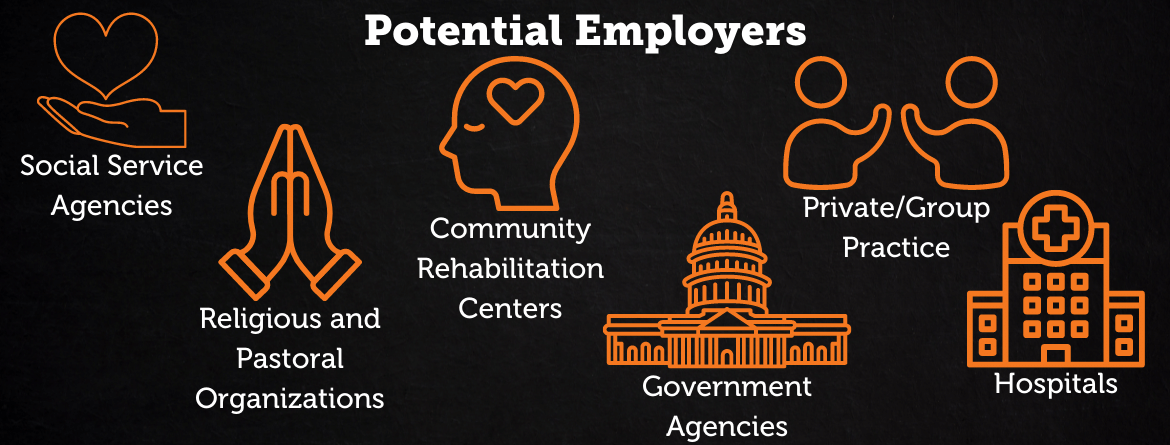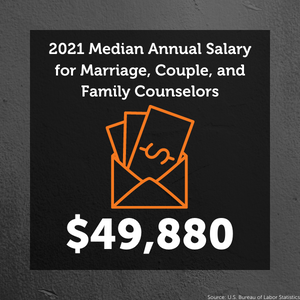Master Of Counseling Degree (M.Coun.) - Marriage, Couple, And Family Counseling - Pocatello and Meridian
Marriage, Couple, and Family Counseling Program Objectives
- Possess knowledge of the history of marriage, couple, and family counseling including philosophical and etiological premises that define the practice of marriage, couple, and family counseling.
- Understand the structure and operations of professional organizations, preparation standards, and credentialing bodies pertaining to the practice of marriage, couple, and family counseling (e.g., International Association of Marriage and Family Counselors-IAMFC).
- Know the ethical and legal considerations specifically related to the practice of marriage, couple, and family counseling (e.g., American Counseling Association [ACA] and IAMFC Code of Ethics)
- Understand the implications of professional issues unique to marriage, couple, and family counseling including, but not limited to, third-party reimbursement and other practice and management issues in marriage, couple, and family counseling
- Understand the roles of marriage, couple, and family counselors across service delivery modalities and networks within the continuum of care, such as primary care, outpatient, partial treatment, inpatient, integrated behavioral healthcare, and aftercare
- Understand the implications of social, cultural, spiritual, diversity, and equity issues relevant to marriage, couple, and family counseling including sociology of the family, family phenomenology, and family of origin theories.
- Understand the marriage, couple, and family life cycle dynamics, structures, and development in a multicultural society, family of origin and intergenerational influences, cultural heritage, socioeconomic status and belief systems.
- Understand the societal trends and interactions of career, life, and gender roles in marriages, couples, and families
- Know a variety of family system theories and models, and their application in working with couples, families, individuals, and other systems (e.g., legal, legislative, and community systems, etc.).
- Understand and develop skills regarding principles and models of relational assessment such as family assessments, including genograms and family mapping and case conceptualization to inform treatment planning and intervention from a systems perspective
- Understand preventive approaches for working with individuals, couples, families, and other systems (e.g., pre-marriage counseling, parenting skills training programs, and relationship enhancement) and the skills necessary for program development and implementation.
- Understand the specific problems that impact family functioning, including issues related to socioeconomic disadvantage, addictive behaviors, interpersonal violence, aging and intergenerational influences and related family concerns, and interventions for addressing in counseling.
- Understand the impact of unemployment, under-employment, migration, and changes in socioeconomic standing and their potential strategies for interfacing with the legal system as a marriage, couple and family counselor.
- Develop techniques and interventions of marriage, couple, and family counseling.
The master’s degree major in Marriage, Couple, and Family Counseling program specialty is designed to prepare individuals to specialize in providing marriage, couple, and family counseling in a variety of settings. Some of the settings where students will serve practicum and internships are mental health centers, rehabilitation counseling offices, juvenile homes and youth ranches, and alcohol and substance abuse centers.
In addition to the Council for Accreditation of Counseling and Related Educational Programs (CACREP) common-core objectives, Marriage, Couple, and Family Counseling majors will:
- Possess knowledge of the history of marriage, couple, and family counseling including philosophical and etiological premises that define the practice of marriage, couple, and family counseling.
- Understand the structure and operations of professional organizations, preparation standards, and credentialing bodies pertaining to the practice of marriage, couple, and family counseling (e.g., International Association of Marriage and Family Counselors-IAMFC).
- Know the ethical and legal considerations specifically related to the practice of marriage, couple, and family counseling (e.g., American Counseling Association [ACA] and IAMFC Code of Ethics)
- Understand the implications of professional issues unique to marriage, couple, and family counseling including, but not limited to, recognition, reimbursement, and right to practice.
- Understand the roles of marriage, couple, and family counselors in a variety of practice settings and in relations to other helping professionals.
- Understand the implications of social, cultural, spiritual, diversity, and equity issues relevant to marriage, couple, and family counseling.
- Understand the marriage, couple, and family life cycle dynamics, structures, and development in a multicultural society, family of origin and intergenerational influences, cultural heritage, socioeconomic status and belief systems.
- Know the human sexuality issues and their impact on family and couple functioning, and strategies for their resolution.
- Understand the societal trends and related treatment issues such as working with families in transition, non-traditional families, and blended families.
- Know a variety of family system theories and other relevant theories and their application in working with couples, families, individuals, and other systems (e.g., legal, legislative, and community systems, etc.).
- Possess interviewing, assessment, and case management skills for working with individuals, couples, families, and other systems, as well as skill in the appropriate implementation of systemic intervention.
- Understand preventive approaches for working with individuals, couples, families, and other systems (e.g., pre-marriage counseling, parenting skills training programs, and relationship enhancement) and the skills necessary for program development and implementation.
- Understand the specific problems that impede family functioning, including issues related to socioeconomic disadvantage, addictive behaviors, person abuse, and interventions for their resolution.
- Understand research and technological applications in marriage, couple, and family counseling.
For the Master of Counseling (M.Coun.) degree, the student is required to complete the equivalent of at least four full semesters of resident graduate study beyond the bachelor’s degree. The minimum Marriage, Couple, and Family Counseling program must total 60 semester hours.
The Idaho Counselor Licensing Board requires the following for licensable hours:
“Section 150 02. Supervised Experience Requirement. One thousand (1,000) hours of supervised experience in counseling acceptable to the Board. (7-1-93)
- One thousand (1,000) hours is defined as one thousand (1,000) clock hours of experience working in a counseling setting, four hundred (400) hours of which shall be direct client contact. Supervised experience in practicum and/or internships taken at the graduate level may be utilized. The supervised experience shall include a minimum of one (1) hour of face-to-face or one-to-one (1/1) or one-to-two (1/2) supervision with the supervisor for every twenty (20) hours of job/internship experience. Face-to-face may include a face-to-face setting provided by a secure live electronic connection between the supervisor and supervisee. As stated under Subsection 150.01.a.iii. counseling practicum experiences opposed to job or internship experience shall be supervised at a ratio of one (1) hour of supervision for every ten (10) hours in the settings. For example: (3-29-12)
- A person in a twenty (20) hour per week job/internship who is receiving one (1) hour of individual supervision each week would accumulate one thousand (1,000) supervised hours in fifty (50) weeks to equal the twenty to one (20/1) ratio. (7-1-93)
- A person in a forty (40) hour per week setting with one (1) hour of supervision per week would still require fifty (50) weeks to equal the twenty to one (20/1) ratio. (7-1-93)
- A person in a forty (40) hour per week setting with two (2) hours of supervision per week would accumulate the one thousand (1,000) hours at the twenty to one (20/1) supervision ratio in twenty-five (25) weeks. (7-1-93)
- Until July 1, 2004, the supervision must be provided by a Professional Counselor or a Clinical Professional Counselor licensed by the state of Idaho. Effective July 1, 2010, supervision must be provided by a counselor education faculty member at an accredited college or university; Professional Counselor, registered with the Board as a supervisor; a Clinical Professional Counselor, registered with the Board as a supervisor; a Marriage and Family Therapist, registered with the Board as a supervisor; a Clinical Social Worker registered as a supervisor with the Board of Social Work; a licensed Psychologist; or a licensed Psychiatrist, licensed by the state of Idaho. Supervision by a professional counseling peer, however, may be acceptable to the Board if the peer/supervisory relationship include the same controls and procedures expected in an internship setting. (See Subsection 150.02.a.) For example, the relationship should include the staffing of cases, the critiquing of counseling tapes and this supervision must be conducted in a formal, professional, consistent manner on a regularly scheduled basis.”
In the Department of Counseling, supervision by doctoral students who have received supervision training are viewed as acceptable to the Board. The Department of Counseling prefers that students seek out practicum and internship settings that have a licensed professional counselor first, before considering a site in which supervision is provided by a different mental health professional. Your development as a professional counselor occurs not only while in class at ISU but also during your clinical experiences outside of ISU. Mentoring by a professional counselor during your clinical supervision is a vital part of your emergent identity as a professional counselor.
Please note: Students are responsible for ensuring a site supervisor is registered with the IBOL prior to accepting a site for practicum or internship.
If you intend to be licensed or certified in a state other than Idaho, you are advised to:
- Review the licensing information for the program(s) below; and
- Contact the appropriate licensing agency in the U.S. states and territories where licensure is intended to ensure that you have the most up-to-date information about licensure requirements and confirm how an ISU program aligns with those requirements. Because requirements may change during the course of your program of study, we recommend that you check licensing agency requirements regularly to monitor whether any changes may impact your licensure plans.
- For more information please see the ISU license disclosure or the Department of Counseling license disclosure.

Career Opportunities
Work in:
- Pre-marital Counseling
- Couples' Counseling
- Conflict Resolution
- Divorce Mediation
- Sexual Counseling
- Child/Spousal Abuse Counseling


.png)
.png)

